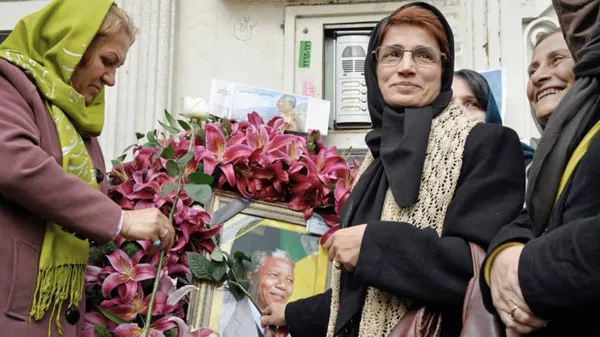Eye For Film >> Movies >> Nasrin (2020) Film Review
Nasrin
Reviewed by: Jennie Kermode

There's an urgency about Jeff Kaufman's latest documentary that's rarely present in what we see onscreen, at least where individuals are concerned. on the one hand it's a portrait of prominent lawyer and women's rights activist Nasrin Sotoudeh. On the other, it's a call for people worldwide to show their support for her - something that her life could depend on.
Arrested in 2018 (in her second brush with the law) and charged with crimes against the state, Nasrin was sentenced to a total of 38 years in prison and 148 lashes. She was an outspoken critic of the country's rulers and had recently made headlines with her defence of women who defied the law by removing their hijabs in public. Her supporters contend that the charges against her were politically motivated and nothing has emerged to suggest otherwise.

Shortly before this review was written, Nasrin was granted three days' leave from prison in order to receive medical treatment, but was returned to Qarchak Prison thereafter - a place which, according to the Human Rights’ Activists News Agency (HRANA), is notorious for its use of solitary confinement, torture and rape, and which is considered by Amnesty International to be a high risk environment for Covid-19, with only very basic medical facilities. As Nasrin has a heart condition, she would be at high risk if she contracted the virus.
Very much made for US and international markets, the film contains a potted history of the fall of the Shah, the Iranian Revolution and the sudden introduction of laws restricting women's lives which followed. Viewers who want to get straight to the meat of the issue may find this a bit distracting and it's not particularly well woven into the story, but it does increase overall accessibility.
Filming began two years before Nasrin's arrest. Kaufman never went to Iran himself but worked remotely, directing local crews who captured much of the material undercover. What emerges is a patchwork film showing Nasrin at work and giving her the chance to speak passionately about her desire for equality, with additional narration and still images filling in the gaps and explaining what happened after her arrest. Nasrin's letters from this period are read by Olivia Colman. We get a brief glimpse of Nasrin meeting with her family from behind glass in Evin Prison. Needless to say, considerable courage has gone into acquiring this footage. It's a reminder of how much support there is for Nasrin within the country.
The fear that Iranian women often express is that people outside the country will forget they are people just like anyone else, either because they are rendered invisible or because their lives will be framed as all doom and gloom. This film is an important reminder that they are not simply waiting around to be rescued by outsiders - that the country has a strong feminist movement of its own (as indeed it did before the revolution). Nasrin will win viewers' sympathy not simply because of her vulnerability but because of her strength and her persistent optimism - her belief that things can get better. Kaufman's film shows us how hard she has worked and hints, thereby, at how much could be lost if she is left in prison.
Uneven though it is, the film picks up the pace as it goes along and supports its arguments well - but it is Nasrin herself, in all her complex humanity, who really makes an impression.
Reviewed on: 26 Jan 2021


















